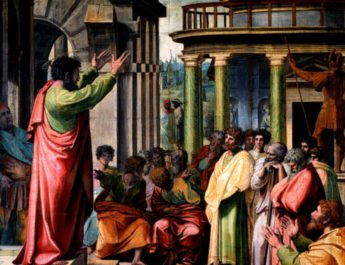1 Corinthians 2:1-16
Fifth Sunday after Epiphany A
1 When I cameI to you, brothersII and sisters, I did not come proclaimingIII the testimonyIV
I “came” = erchomai. This is to come or go.
II “brothers” = adelphos. From a (with, community, fellowship) + delphus (womb). This is a brother in a literal or figurative sense. It is also used of another member of the Church.
III “proclaiming” = kataggello. 18x in NT. From kata (down, against, according to, throughout, among, daily) + aggello (to announce, report) {from aggelos (angel, messenger – supernatural or human envoy of God); probably from ago (lead, bring, drive, carry, guide, go)}. This is to proclaim openly and confidently a very specific message. It can also be celebrate, preach, or teach.
IV “testimony” = marturion. 19x in NT. From martus (a witness whether having heard or seen something; witness literally, judicially, or figuratively; by analogy, a martyr). This is something that counts as evidence whether a witness, testimony, or other proof.
of GodV to you with superiorVI speechVII or wisdom.VIII
V “God” = Theos. From Proto-Indo-European origins, meaning do, put, place. This is God or a god in general.
VI “superior” = huperoche. 2x in NT. From huperecho (to hold above, surpass, governing, high quality or value.; to have beyond, excel); {from huper (by, under, over, above, under the authority of another) + echo (to have, hold, possess)}. This is prominence, authority, excellence. It can be elevated or having a superior social standing or character.
VII “speech” = logos. From lego (to speak, tell, mention). This is word, statement, speech, analogy. It is a word that carries an idea or expresses a thought, a saying. It could refer to a person with a message or reasoning laid out in words. By implication, this could be a topic, line of reasoning, or a motive. It can be used for a divine utterance or as Word – Christ.
VIII “wisdom” = sophia. From sophos (wise, clever, skilled, learned, cultivated); related to saphes (clear). This is skill, wisdom, insight, intelligence, clarity. It is wisdom as applied through a practical skill or shrewdness. It is not thoughtfulness or the mere gaining of intelligence for its own sake. Sophia is wisdom in action for everyday living.
2 For I decidedIX to knowX nothing among you except JesusXI ChristXII and him crucified.XIII
IX “decided” = krino. To judge, decide, think good, condemn, determine, pass judgment, stand trial, sue. This is judging whether it is done in court or in a private setting. Properly, it refers to mentally separating or distinguishing an issue – to come to a choice or decision, to judge positively or negatively in seeking what is right or wrong, who is innocent or guilty. It can imply trying, condemning, punishing, or avenging.
X “know” = eido. This is to know, consider perceive, appreciate, behold, or remember. It means seeing with one’s eyes, but also figuratively, it means perceiving – seeing that becomes understanding. So, by implication, this means knowing or being aware.
XI “Jesus” = Iesous. From Hebrew Yehoshua (Joshua, the Lord is salvation); {from YHVH (proper name of the God of Israel; the self-existent and eternal one); {from havah (to become) or from hayah (to come to pass, become, be)} + yasha (to deliver, defend, help, preserve, rescue; properly, to be open, wide or free, which implies being safe. So, in a causative sense, this is to free someone)}. This is Jesus or Joshua in Greek – the Lord saves or the Lord is salvation.
XII “Christ” = Christos. From chrio (consecrate by anointing with oil; often done for prophets, priests, or kings). Literally, the anointed one, Christ. The Greek word for Messiah.
XIII “crucified” = stauroo. From stauros (upright stake, cross; literally the horizontal beam of a Roman cross, generally carried by the one convicted to die); from the same as histemi (to stand, cause to stand). This can be to attach someone to a cross or fencing with stakes. In a figurative sense, it could be to destroy, mortify, or subdue passions/selfishness.
3 And I cameXIV to you in weaknessXV and in fearXVI and in muchXVII trembling.XVIII
XIV “came” = ginomai. This is to come into being, to happen, become, be born. It can be to emerge from one state or condition to another or is coming into being with the sense of movement or growth.
XV “weakness” = astheneia. From asthenes (without strength, sick, deprivation; weak in a moral or physical sense); {From a (not) + sthenes (strong, vigor); {from the base of sthenoo (to strengthen so that one can be mobile); from sthenos (strength)}}. This is weakness, frailty, illness, suffering, or calamity. It is any kind of sickness or injury that includes weakness or diminishes your ability to enjoy or accomplish what you would choose.
XVI “fear” = phobos. From phebomai (to flee, withdraw, be put to flight). This is panic flight, fear, fear being caused, terror, alarm, that which causes fear, reverence, respect.
XVII “much” = polus. This is much, often, plenteous – a large number or a great extent.
XVIII “trembling” = tromos. 5x in NT. From tremo (shaking, particularly from fear or dread); from treo (to dread or terrify). This is trembling, shaking, or quaking from fear. This is the root of the term “tremolo.”
4 My speech and my proclamationXIX were made not with persuasiveXX wordsXXI of wisdom
XIX “proclamation” = kerugma. 9x in NT. From kerusso (proclaim, preach, publish; properly, to act as a herald – announcing something publicly with confidence and/or to persuade). This is proclamation – both the preaching and that which is preached. Sometimes times used to refer to the Gospel itself.
XX “persuasive” = peithos. 1x in NT. From peitho (to have confidence, urge, be persuaded, agree, assure, believe, have confidence, trust). This is persuasive, plausible, or skillful.
XXI “words” = logos. Same as “speech” in v1. See note VII above.
but with a demonstrationXXII of the SpiritXXIII and of power,XXIV
XXII “demonstration” = apodeixis. 1x in NT. From apodeiknumi (to show, demonstrate, attest, exhibit); {from apo (from, away from) + deiknumi (to show, point out, exhibit; figurative for teach, demonstrate, make known)}. This is a proof or manifestation.
XXIII “Spirit” = pneuma. From pneo (to blow, breathe, breathe hard). This is wind, breath, or ghost. A breeze or a blast or air, a breath. Figuratively used for a spirit, the human soul or part of us that is rational. It is also used supernaturally for angels, demons, God, and the Holy Spirit. This is where pneumonia comes from.
XXIV “power” = dunamis. From dunamai (to be able, have power or ability). This is might, strength, physical power, efficacy, energy, and miraculous power. It is force literally or figuratively – the power of a miracle or the miracle itself.
5 so that your faithXXV might restXXVI not on humanXXVII wisdom but on the power of God.
XXV “faith” = pistis. Related to “plausible” in v4. From peitho (see note XX above). This is less about knowing, believing, and repeating a list of doctrines then it is about trusting God. Faith means listening to God and seeking to live a holy life even (and especially) when we don’t understand how everything works or fits together. Faith is about being faithful (trusting and doing) rather than being all knowing.
XXVI “rest” = eimi. This is to be or exist.
XXVII “human” = anthropos. Probably from aner (man, male, husband) + ops (eye, face); {from optanomai (to appear, be seen); perhaps from horao (become, seem, appear)}. This is human, humankind. Used for all genders.
6 Yet among the matureXXVIII we do speak wisdom, though it is not a wisdom of this ageXXIX or of the rulersXXX of this age, who are being destroyed.XXXI
XXVIII “mature” = teleios. 19x in NT. From telos (an end, aim, purpose, completion, end goal, consummation, tax). This is going through the steps to complete a stage or phase and then moving on to the next one. This is reaching an end and so being complete or “perfect.” It is also full grown or mature.
XXIX “age” = aion. From the same as aei (ever, always, unceasingly, perpetually; on every occasion). This is an age, cycle of time, course, continued duration. It is also used to describe the eternal or forever. This is the word used to discuss the present age or the messianic age.
XXX “rulers” = archon. From archo (to rule, begin, have first rank or have political power). This is ruler, leader, magistrate, official, prince, chief.
XXXI “destroyed” = katargeo. From kata (down, against, according to, among) + argeo (to delay, linger, be at rest, be idle, do nothing); {from argos (inactive, idle, lazy, thoughtless, useless, unemployed, unprofitable) {from a (not) + ergon (word, task, action, employment)}}. This is making something inactive or bringing it to nothing. So, it could mean making something inoperative or powerless, annulling, or severing. It can also mean to make something ineffective or invalid.
7 But we speak God’s wisdom, a hiddenXXXII mystery,XXXIII which God decreedXXXIV before the ages for our gloryXXXV
XXXII “hidden” = apokrupto. 4x in NT. From apo (from, away from) + krupto (to hide by covering, secret, hidden things). This is to hide, keep secret.
XXXIII “mystery” = musterion. From mustes (an initiate); from mueo (to initiate someone into the secrets or mysteries of an order; to instruct learn, be disciples; properly, shutting your mouth and eyes to experience mystery); from muo (shutting eyes or mouth). This is a mystery or a secret doctrine that requires initiation to learn. In the New Testament, the plans of God were hidden until they were revealed in Christ through the Gospel. It is also used of Christian revelation in a broad sense rather than referring to something that cannot be known. This is the root of the word “mystery.”
XXXIV “decreed” = proorizo. 6x in NT. From pro (before, earlier than, ahead, prior) + horizo (to determine, set boundaries, appoint, designate, pre-determined; literally, this is setting horizons); {from the same as horion (boundary, territory); from horos (limit, boundary)}. This is to predetermine, to set limits or boundaries in advance. Figuratively, it is foreordain or predestine.
XXXV “glory” = doxa. From dokeo (to have an opinion, seem, appear, suppose; a personal judgment; to think); from dokos (opinion). This is literally something that evokes a good opinion – something that connects to our understanding of intrinsic worth. The ultimate expression of this is, of course, God and God’s manifestation. So, this is opinion, honor, and dignity, but also praise, glory, renown, and worship.
8 and which none of the rulers of this age understood,XXXVI for if they had,XXXVII they would not have crucified the LordXXXVIII of glory.
XXXVI “understood” = ginosko. This is to know, recognize, realize, perceive, learn. It is knowledge gained through personal experience.
XXXVII “had” = ginosko. Same as “understood” in v8. See note XXXVI above.
XXXVIII “Lord” = Kurios. From kuros (authority, supremacy). This is a respectful address meaning master or sir. It refers to one who has control or power greater than one’s own. So, it was also applied to God and Jesus as Master or Lord.
9 But, as it is written,XXXIX
“What no eyeXL has seen,XLI nor earXLII heard,XLIII
XXXIX “written” = grapho. This is to write or describe. It is where the word “graphic” comes from.
XL “eye” = ophthalmos. Related to “human” in v5. From optanomai (see note XXVII above). This is eye or sight. It is used figuratively for the mind’s eye, a vision, or for envy.
XLI “seen” = horao. Related to “human” in v5 & “eye” in v9. See note XXVII above.
XLII “ear” = ous. This is the physical ear, or the perception of hearing, whether physical or cognitive.
XLIII “heard” = akouo. This is hear or listen, but it also means to understand by hearing. This is where the word “acoustics” comes from.
nor the human heartXLIV conceived,XLV
what God has preparedXLVI for those who loveXLVII him”—
XLIV “heart” = kardia. Literally the heart, but figuratively mind, character, inner self, will, intention, thoughts, feelings. Also, the center of something. The word heart is only used figuratively in the Old and New Testaments. This is where “cardiac” comes from.
XLV “conceived” = anabaino. From ana (up, back, among, again, anew) + the same as basis (step, hence foot; a pace); {from baino (to walk, to go)}. This is to come up in a literal or figurative sense – ascent, rise, climb, enter.
XLVI “prepared” = hetoimazo. From hetoimos (make ready, be ready because of being prepared, standing by, adjusted; ready to meet some opportunity or challenge). This is to prepare or provide.
XLVII “love” = agapao. Perhaps from agan (much). This is love, longing for, taking pleasure in. It is divine love or human love that echoes divine love.
10 God has revealedXLVIII to us through the Spirit, for the Spirit searchesXLIX everything,L even the depthsLI of God.
XLVIII “revealed” = apokalupto. From apo (from, away from) + kalupto (to cover, hide, conceal; figuratively, to keep hidden or secret) {related to kalube (hut, cabin)}. This is properly to uncover so it means revealing something that was hidden or obstructed. It particularly refers to revealing the essence of something. This is to make plain or manifest. This is the root verb that “apocalypse” comes from.
XLIX “searches” = ereunao. 6x in NT. From eraunao (to search or examine); perhaps from ereo (to say, tell, speak, mean, command); perhaps from rheo (to say, speak of, command). This is to seek or examine. Figuratively, it can mean to investigate or desire to know.
L “everything” = pas. This is all or every.
LI “depths” = bathos. 8x in NT. From bathus (deep in a literal or figurative sense); from the same root as basis (step, foot). This is depth, fullness, profundity, or immensity. This is where the term “bathysphere” comes from, but not the English word “bath.”
11 For what human knows what is truly human except the human spirit that is within? So also no one comprehendsLII what is truly God’s except the Spirit of God. 12 Now we have receivedLIII not the spirit of the worldLIV but the Spirit that is from God, so that we may understandLV the gifts bestowedLVI on us by God.
LII “comprehends” = ginosko. Same as “understood” in v8. See note XXXVI above.
LIII “received” = lambano. It does not refer to passive receiving of something, but active acceptance or taking of something whether it is offered or simply nearby. It focuses on individual decision and action.
LIV “world” = kosmos. Perhaps from the base of komizo (to carry, convey, recover); from komeo (to take care of). This is order, the world, the universe, including its inhabitants. Literally, this is something that is ordered so it can refer to all creation. It can also refer to decoration in the sense that something is better ordered and, thus, made more beautiful. This is where “cosmos” and “cosmetics” come from.
LV “understand” = eido. Same as “know” in v2. See note X above.
LVI “bestowed” = charizomai. From charis (grace, kindness, favor, gratitude, thanks; being inclined to or favorable towards – leaning towards someone to share some good or benefit; literal, figurative, or spiritual; grace as abstract concept, manner, or action); from chairo (to rejoice, be glad; used to say hello; properly, delighting in the grace of God or experiencing God’s favor); from char– (to extend favor, lean towards, be inclined to be favorable towards). This is to extend grace or favor, to grant forgiveness, to pardon or rescue.
13 And we speak of these things in words not taughtLVII by humanLVIII wisdom but taught by the Spirit, interpretingLIX spiritualLX things to those who are spiritual.
LVII “taught” = didaktos. 3x in NT. From didasko (to teach, direct, instruct, or impart knowledge; in the New Testament, almost always used for teaching scripture); from dao (to learn). This is taught or instructed.
LVIII “human” = anthropinos. Related to “human” in v5 & “eye” and “seen” in v9. 7x in NT. From anthropos (see note XXVII above). This is human, in human terms, belonging to humans. It is used to contrast human and vine things.
LIX “interpreting” = sugkrino. Related to “decided” in v2. 3x in NT. From sun (with, together with) + krino (see note IX above). This is to combine, compare, explain. It can refer to interpreting something by comparing one truth with another and coming up with a unified notion.
LX “spiritual” = pneumatikos. Related to “Spirit” in v4. From pneuma (see note XXIII above). This is spiritual, spiritual people, or spiritual things – that which is ethereal or divine or religious.
14 Those who are unspiritualLXI, LXII do not receiveLXIII the gifts of God’s Spirit,
LXI “unspiritual” = psuchikos. 6x in NT. From psuche (breath, the breath of life, the self, individual, soul; that which makes a person unique – their identity, will, personality, affections; this isn’t the soul as the immortal part of us, but as our individuality; not life as a general concept, but specific to people); from psucho (to breathe, blow). This is natural, animal, sensitive, having the mind of the world. It relates to physical life and behavior. Pneumatikos is the highest of our natures and phusikos is the lowest of our natures (our animal side). Psuchikos is in between.
LXII {untranslated} = anthropos. Same as “human” in v5. See note XXVII above.
LXIII “receive” = dechomai. This is to warmly receive, be ready for what is offered, take, accept, or welcome. It is to receive in a literal or figurative sense.-
for they areLXIV foolishnessLXV to them, and they are unableLXVI to understandLXVII them
LXIV “are” = eimi. Same as “rest” in v5. See note XXVI above.
LXV “foolishness” = moria. Related to “mystery” in v7. 5x in NT. From moros (dull, stupid, foolish, flat; literally, not having an edge; used figuratively for someone whose understanding is dull, is sluggish, acts in a brainless way, or does not fully have a grip on reality); perhaps from musterion (see note XXXIII above). This is foolishness, absurdity, or dullness. This is where the word “moron” comes from.
LXVI “unable” = ou + dunamai. Literally, “not…able.” Dunamai is related to “power” in v4. See note XXIV above.
LXVII “understand” = ginosko. Same as “understood” in v8. See note XXXVI above.
because they are spirituallyLXVIII discerned.LXIX 15 Those who are spiritual discern all things,LXX and they are themselves subject to no one else’s scrutiny.LXXI
LXVIII “spiritually” = pneumatikos. Related to “Spirit” in v4 & “spiritual” in v14. 2x in NT. From pneumatikos (see note LX above). This is spiritually or mystically.
LXIX “discerned” = anakrino. Related to “decided” in v2 & “interpreting” in v13. 16x in NT. From ana (up, again, back, among, anew) + krino (see note IX above). 16x in NT. This is to scrutinize, examine, investigate, judge, or discern. Properly, it refers to very thorough investigation or careful study. It was used to talk about investigating crimes in the ancient world. It can also be used to talk about interrogation that uses torture.
LXX “all things” = pas. Same as “everything” in v10. See note L above.
LXXI “scrutiny” = anakrino. Same as “discerned” in v14. See note LXIX above.
16 “For who has knownLXXII the mindLXXIII of the Lord
so as to instructLXXIV him?”
But we haveLXXV the mind of Christ.
LXXII “known” = ginosko. Same as “understood” in v8. See note XXXVI above.
LXXIII “mind” = nous. Related to “understood” in v8. From noos (mind) OR from the same as ginosko (see note XXXVI above). This is mind, understanding, reasoning faculty, intellect, capacity to reflect. It can refer to God’s mind or human minds – thoughts, feelings, will, or reflective thinking.
LXXIV “instruct” = sumbibazo. Related to “conceived” in v9. 7x in NT. From sun (with, together with) + the same as basis (see note XLV above) {from baino (to walk to go)} OR sun (with, together with) + bibazo (to force); {from the same as basis (see above)}. This is joining together, considering, uniting, concluding, proving, or teaching. It is building reasoning – working through the steps to grasp truth by weaving ideas together to form a judgment or a conclusion. By extension, it is applying that understanding to showing or teaching.
LXXV “have” = echo. Related to “superior” in v1. See note VI above.
Image credit: “Crucifixion” by Emma Schlangenhausen, 1929.




